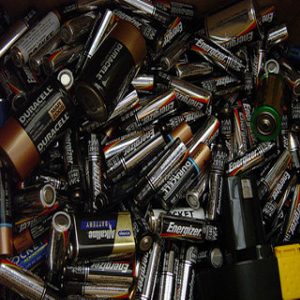Batteries are batteries right? Sure, and computers are computers, and tires are tires. Oh, what's that? You say there's a big difference between a Mac and PC, and tractor tires and car tires? Well, so too there are big differences between the different types of batteries that are available. Obviously the physical sizes are different like your AAA's and your D's, but the differences go deeper.
The construction and composition of the charge generating materials can be significantly different as well. You might be familiar with terms like Ni-Cad and Lithium, but what does that really mean? What we'll cover here is some of the difference between the types and the right battery for the right job. Let's make sure we get the right battery for the job. By the way, with Daylight Savings time just having arrived, now's a good time to change the batteries in your smoke detectors as well.
For this article, we're focusing on non-rechargeable batteries. Most devices that we have today that have rechargeable batteries have battery packs that only fit in that device, such as your laptop or cell phone. If you're interested in finding out more about those kinds of batteries, check our other articles on the topic. To determine what kind of battery is the right one for the job, let's think about the different kinds of jobs we might be doing. There aren't many jobs that can't be done with a battery powered device these days.
Light-Duty Jobs
These are those jobs that don't require a whole lot of power but we might be doing the job for a fair bit of time. In this case you need a battery that might have lower output but better endurance. Jobs such as running a flashlight, or maybe a small radio could fall into this category.
Medium Duty Jobs
Once you put any sort of small electrical motor into the device, you are looking at a medium duty job at the very least. These motors require a bit more amperage at the start to get them going, and then the load decreases to maintain the motor running. Some examples of this might be a small fan, or some toys with moving parts like a Furby.
Heavy Duty Jobs
This class of job is going to be one that requires high output on starting and continued output through the course of the job. They will either be jobs that are running a heavier duty motor, or charging a capacitor to be discharged later - like a camera flash. Some examples of this would be power tools or, of course, camera flashes.
Light Duty Batteries
When you're looking at single-use type batteries for light duty uses, you'll may be looking at a battery that is composed of zinc chloride. Zinc chloride is an inexpensive chemical so you'll find it in batteries that are typically the least expensive. It is capable of generating a low amp charge for an extended period. If you bought a cheap device that came with batteries, there's a good chance they could be zinc chloride.
Fun fact - heavily diluted zinc chloride is used in some mouth wash. Isn't that a lovely thought?
Medium Duty
Slightly more expensive and possibly the most widely known is the alkaline battery. The chemicals in this battery creates an electrical charge and sustains the generation of the charge for a relatively long time. The alkaline battery is also capable of holding its charge for a long time on the shelf.
That makes them ideal for emergency use items such as flashlights, yet inexpensive enough to be used in kid's toy's where they are likely to suffer a fair amount of use and abuse.
Heavy Duty Batteries
Lithium is the word in batteries for powering tools and camera flashes. With each cell putting out about twice the amount of voltage as the same cell in alkaline, you can see how lithium batteries would be ideal for the heavier duty jobs. Because it has greater output in a smaller form factor, you'll also find them in devices where space is limited - like on the motherboard of your computer.
The lithium battery is also less affected by temperature, allowing them to be used in all sorts of weather conditions. Ideal for the tradesman of nature photographer. Of course, lithium is a costlier material to acquire and makes these batteries more expensive.
So which battery is the right battery for your device?. Your best bet is to follow the maker's recommendations. They've already put the thought into what will work best and have an interest in keeping you happy. We've talked about the different applications of batteries and the different compositions of batteries. Hopefully that makes it easier for you to understand why a manufacturer might call for a specific type of battery for your device.
They aren't just trying to sell you a lot of poppycock. it is worth it to spend the few extra cents and get the lithium batteries for your camera if that's required. And yes, the alkaline battery probably is the best one to use in your emergency flashlights.
If this article has helped you out a bit, let us know in the comments. We always like to hear how we're doing and will try to help you out if needed.
Image credits: Bunch of Batteries via moria at Flickr, Old Fashioned Radio via alexkerhead at Flickr, Power Drill via dmuthat Flickr, Expert Putting CMOS Battery in Motherboard via Shutterstock




